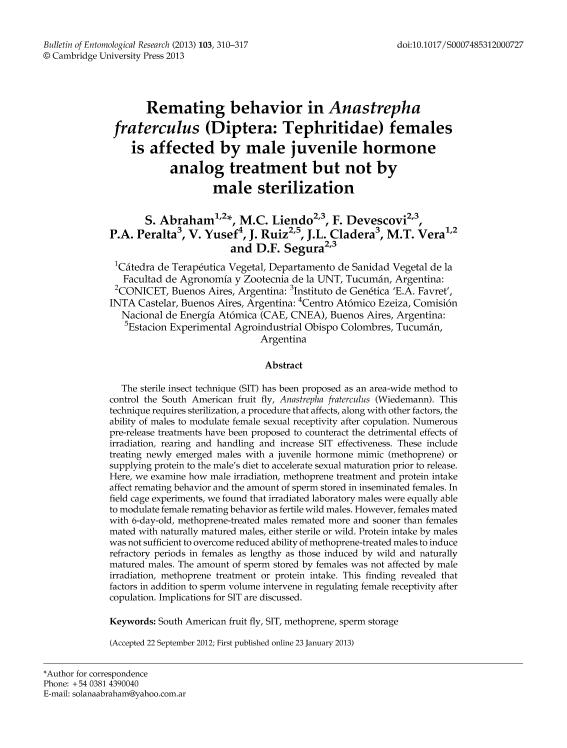Artículo
Remating behaviour in Anastrepha fraterculus (Diptera: Tephritidae) females is affected by male juvenile hormone analog treatment but not by male sterilization
Abraham, Solana ; Liendo, María Clara
; Liendo, María Clara ; Devescovi, Francisco
; Devescovi, Francisco ; Peralta, P. A.; Yusef, V.; Ruiz, María Josefina
; Peralta, P. A.; Yusef, V.; Ruiz, María Josefina ; Cladera, J. L.; Vera, Maria Teresa
; Cladera, J. L.; Vera, Maria Teresa ; Segura, Diego Fernando
; Segura, Diego Fernando
 ; Liendo, María Clara
; Liendo, María Clara ; Devescovi, Francisco
; Devescovi, Francisco ; Peralta, P. A.; Yusef, V.; Ruiz, María Josefina
; Peralta, P. A.; Yusef, V.; Ruiz, María Josefina ; Cladera, J. L.; Vera, Maria Teresa
; Cladera, J. L.; Vera, Maria Teresa ; Segura, Diego Fernando
; Segura, Diego Fernando
Fecha de publicación:
01/2013
Editorial:
Cambridge University Press
Revista:
Bulletin Of Entomological Research
ISSN:
0007-4853
Idioma:
Inglés
Tipo de recurso:
Artículo publicado
Clasificación temática:
Resumen
The sterile insect technique (SIT) has been proposed as an area-wide method to control the South American fruit fly, Anastrepha fraterculus (Wiedemann). This technique requires sterilization, a procedure that affects, along with other factors, the ability of males to modulate female sexual receptivity after copulation. Numerous pre-release treatments have been proposed to counteract the detrimental effects of irradiation, rearing and handling and increase SIT effectiveness. These include treating newly emerged males with a juvenile hormone mimic (methoprene) or supplying protein to the male´s diet to accelerate sexual maturation prior to release. Here, we examine how male irradiation, methoprene treatment and protein intake affect remating behavior and the amount of sperm stored in inseminated females. In field cage experiments, we found that irradiated laboratory males were equally able to modulate female remating behavior as fertile wild males. However, females mated with 6-day-old, methoprene-treated males remated more and sooner than females mated with naturally matured males, either sterile or wild. Protein intake by males was not sufficient to overcome reduced ability of methoprene-treated males to induce refractory periods in females as lengthy as those induced by wild and naturally matured males. The amount of sperm stored by females was not affected by male irradiation, methoprene treatment or protein intake. This finding revealed that factors in addition to sperm volume intervene in regulating female receptivity after copulation. Implications for SIT are discussed.
Palabras clave:
South American Fruit Fly
,
Sit
,
Methoprene
,
Sperm Storage
Archivos asociados
Licencia
Identificadores
Colecciones
Articulos(CCT - NOA SUR)
Articulos de CTRO.CIENTIFICO TECNOL.CONICET - NOA SUR
Articulos de CTRO.CIENTIFICO TECNOL.CONICET - NOA SUR
Articulos(SEDE CENTRAL)
Articulos de SEDE CENTRAL
Articulos de SEDE CENTRAL
Citación
Abraham, Solana; Liendo, María Clara; Devescovi, Francisco; Peralta, P. A.; Yusef, V.; et al.; Remating behaviour in Anastrepha fraterculus (Diptera: Tephritidae) females is affected by male juvenile hormone analog treatment but not by male sterilization; Cambridge University Press; Bulletin Of Entomological Research; 103; 3; 1-2013; 310-317
Compartir
Altmétricas



